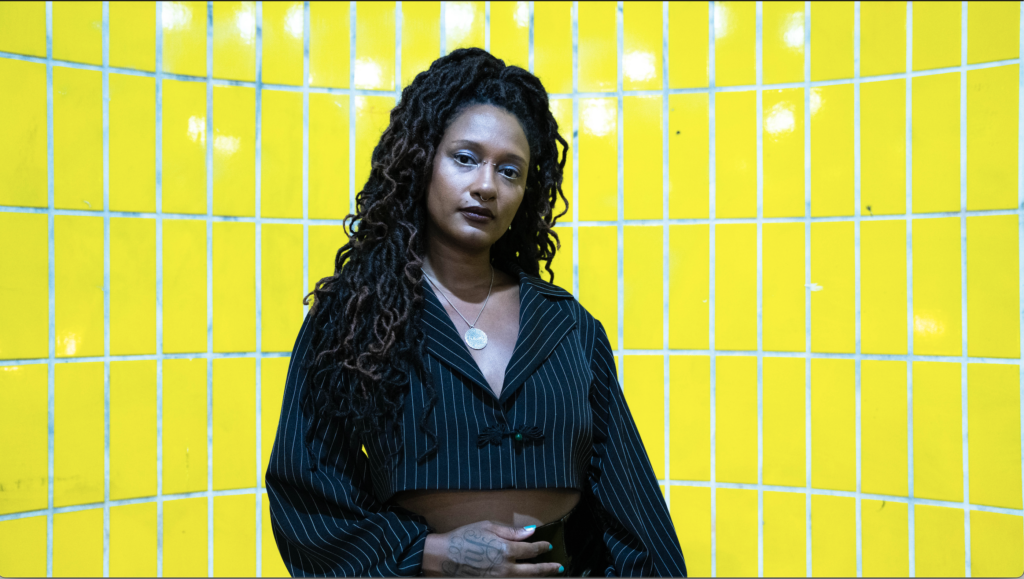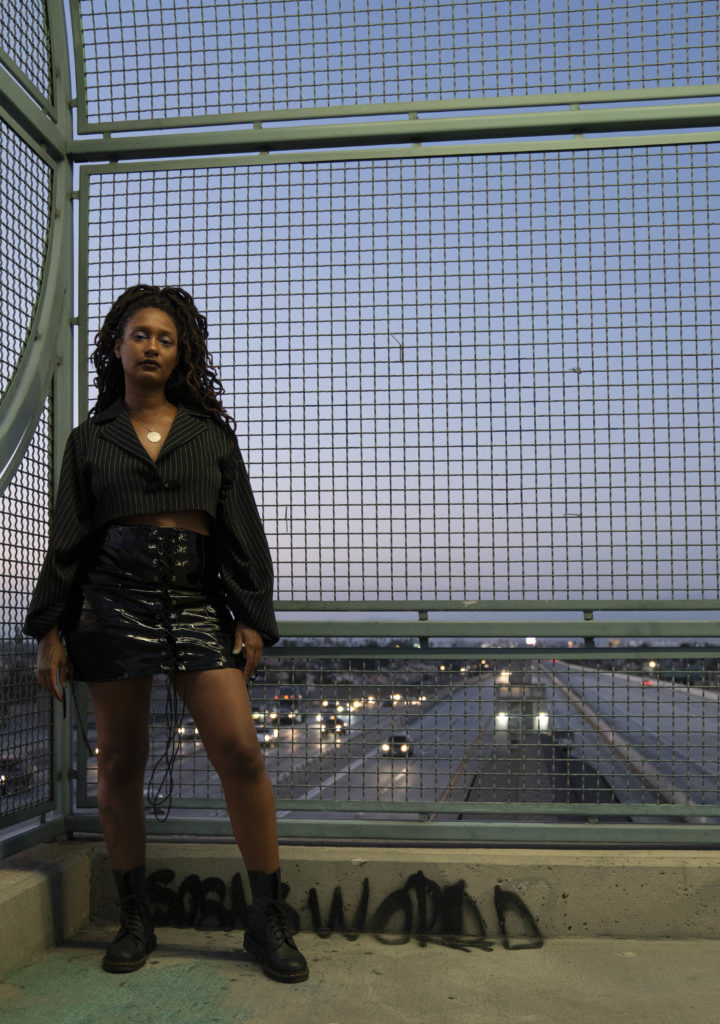Hood Raves with BAE BAE
The DJ and filmmaker on throwing Hood Raves and creating spaces for Black femmes.
Text: Hugo Cervantes
Photography: Penelope Uribe-Abee
BAE BAE’s new EP spiral meditates on the absence of nightlife. In her twenty-two minute dip of club euphoria and glossy vocals, BAE BAE spells out the rolling motions of having nowhere to go to sweat and blur among club crowds. For the Los Angeles native, the question of nowhere became an invitation to forge space. Negress World, a platform and her accompanying Dublab radio show became one way for the artist to connect with and amplify Black femme DJs on and offline having organized DJing and production workshops, to throwing local hood raves in South Central. spiral, her ep, then is a missive or map to the space and time in-between digital and physical clubs, to nightlife’s future.
Hugo Cervantes – HRLA
BAE BAE
How did you begin to DJ in LA?
I was a filmmaker at UCLA. I graduated at 21 and then I started to DJ nights at a bar in Culver City and got a ladies’ night. At that time I thought women could do these things better than men. I felt it was important for women to be the center. Then I went back to filmmaking at Columbia which is really when I thought of myself principally as a filmmaker.
Were you clubbing at Columbia?
You know what’s funny and weird? I never really clubbed. (laughs) I went to bars out here before I went out there and a lot of djs are born out of nightlife in a certain way but I never — the types of music I play now house, club, jungle, sometimes techno I didn’t really get into until I came back to LA. When I was in New York I was into a lot of hip-hop. I was listening to Pharcyde, and older things, a lot of Earth, Wind, & Fire, and The Commodores. I just love Black music! When I was transitioning from electronic music I was into remixes and reconceptualizations of those songs and so now I make a lot of R&B mixes

When you are making a mix do you have a visual or image of the mix?
I don’t think it is visual but it is narrative. It’s a sonic story, and plays a lot of emotion so I feel like that’s where I am really good. I am really empathic and use that to make it my own — to put things together.
The BLACK Femme Supremacy mix starts with an Assata quote that I put over a Lotic song and I felt like — it’s actually vogue, there is a lot of hits in it and impacting sound effects of people getting hit. I felt like it connected with the violence she faced. I don’t know if you have read her autobiography but at the start she talks about all the violences the state committed against her. I was just trying to make something evocative, that you could feel but somehow make it empowering for Black femmes. She demonstrates how we can empower ourselves. I think of her as a figure who is inspirational.
As a filmmaker do you ever get the sense of feeling constrained or limited by the image and therefore turn to music?
I felt confined by what is allowed to be cinema. What rules there are. It is very prescribed and when I was at film school I was looking to make illegal things. We were learning what narrative was, and I was like, “Well, what if we told this story? Is that permissible?”cThere is this Nigerian man Umar Farouk Abdulmutallab who had become radacalized by online forums and became a Jihadist. There were a lot of interesting moral questions like—why would a Black man align himself with Jihadism? There are many reasons to be opposed to the West and its many forms of oppression. And I was like, what if I make this film? A film that talks about the entanglements of religion, race, geography, and time. And no one wanted to produce it which I guess is valid but I don’t think they understood the depth of the kinds of questions I was trying to enact with that film.
School can be and should be a place for those films to exist. It makes sense why they told you not to do it.
That’s when I learned or thought I should have been at an art school but even then I’m sure I would have been policed in some ways. That is something about film school, they have rules of what they are trying to reproduce. Most of them are trying to reproduce liberal ideology. “We are all the same.” Universalism. I found it limiting and thought how do you go against universalism? Make a story about someone who wants to blow up that system, but I just wasn’t brave enough to do it on my own or didn’t figure it out then. My politics were growing.
In an interview with Dublab you talked about America’s short political memory and how as a DJ inserting political speeches in mixes is one way to remind people of the history of radicalism within the United States.
Assata is the root of the underground. She is not someone who was a big voice of the movement. She was more of an introvert (like me!). She taught kids in the movement because The Black Panthers did so many educational programs. She was teaching young people different political history and art and poetry. But she was turned into this evil being by the C.I.A.
What is it like organizing DJs for Negress World? How do you all connect?We have mostly met in Los Angeles. LA has brought people from all over and the DJs who have done Dublab shows. I have done different collective moments like Negress Sound Sessions where we would meet and talk about music or would teach, like BAMBII, a DJ from Toronto. There is a full moon healing group I was organizing for a year and we met through those spaces. I just want to give new artists opportunities because a lot of the times Black femmes are ignored especially on the west coast. I think on the east coast femme DJs are more revered.
There is stronger DJ culture there. How LA is organized, really as fragments, makes it difficult for a strong sense of unity. You’d have to cultivate and sustain it.
That is frustrating. I think it is why I wonder if I want to continue to DJ because there isn’t a cultural apparatus here. It’s kind of a bunch of individuals who DJ rather than collectives.
My mind goes to Mustache Mondays and I think of it’s felt absence in the city as a club night centering queer Black and brown people.
Even with Mustache, Nacho was struggling because he was the infrastructure. In LA the promoter is the infrastructure. That is how I feel about the Hood Rave. It is not the ideal way to to contribute to a culture and/or make something sustainable. On the east coast there are more collectives doing things together and there are public institutions that support DJs. Here in LA, it is much harder. It is like you are just an individual in the desert.

Could hood raves be sustainable?
I don’t know if sustainable is the word because sustainability often means you have to go to dominant institutions or be a productive capitalist to make it happen. Suitability often means you rely on capitalist institutions.
DJing is healing. This work is healing. I think that is why I went from filmmaking to DJing. Filmmaking felt competitive. I started going to clubs in LA after my film degree because that’s what felt healing to me, listening to music. That’s why I started throwing events because there were no events for queer femme or nights for Black queer people.
To go back to the dublab interview, you spoke about how as a promoter it’s important to have nimble and flexible relationships with the venues because having a migratory party helps sustain the life of the party.
It’s like being a hermit crab. But I think that is the nature of how Black Radicalism is. It is one thing Assata talks about. She was critical of certain Black men in the black panther movement that were committed to defending physical space. She was like I don’t know why we aren’t moving like guerilla’s — doing guerilla warfare — when you are up against a dominant superpower!
You become invisible and work within the cracks when you are organizing events for people who are not the dominant represented people. You always have to keep going, be nimble.
It is what is so special and fucked up about Hood Raves. How they are created really out of necessity and urgency to dance, to be with other people of your community, share a cigarette and in that same need speaking to the lack of spaces for that to happen.
Especially here in South Central! Especially here, that is where I feel I am necessary because if it already existed I probably wouldn’t have done anything but there is the necessity for it. The circumstances make you into a creative producer.
I used to live in Imperial and Vermont and I used to always complain about going up north for anything. Having nights like the Hood Rave below the 10 highway is rare.
I wanted it to be a party in our own neighborhood. That is a part of the vision. In that way, it challenges gentrification and the idea that cultural capital is centered in the bougie neighborhoods. I’m thinking Highland and Echo Park which are highly gentrified. I was actively challenging the idea that folks have to go to largely white neighborhoods to enjoy themselves.
What do you think nightlife will look like post-Covid? It has to keep going. I do want someone to take it (the Hood Raves) to continue creating space in LA for Black queer people. In being anti-capitalist I do not want to own it I want other black femmes and queers to keep it happening in other places. Nobody owns it, nobody can claim it.
You can stream BAE BAE’s new EP, spiral on Bandcamp